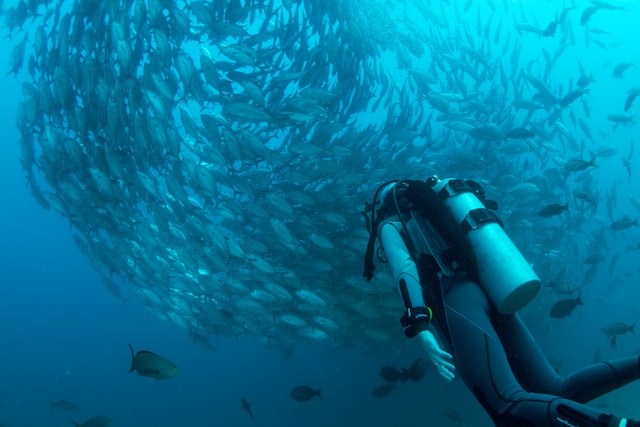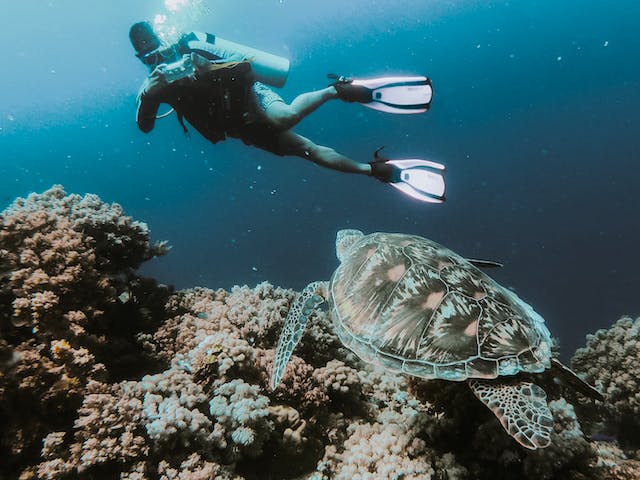23rd Nov 2023
10 Ways You Can Minimize Your Environmental Impact When Diving
Scuba diving is a breathtaking experience that allows us to explore the wonders of the underwater world. However, it's important to remember that as divers, we have a responsibility to protect the delicate marine environment. By following these ocean-friendly diving practices, you can minimize your environmental impact and contribute to the conservation of our oceans.
How to Minimize Your Environmental Impact When Diving

1. Practice Buoyancy Control
One of the most crucial skills for a diver is maintaining proper buoyancy. Avoid touching or standing on the reef, as even a slight touch can cause damage to the fragile corals and marine life. By fine-tuning your buoyancy, you'll be able to float effortlessly above the reef, preserving its integrity.
2. Choose Eco-Friendly Dive Operators
Supporting eco-conscious dive operators is a significant step towards responsible diving. Look for operators that adhere to sustainable practices, such as using eco-friendly cleaning products, recycling, and participating in conservation efforts. They often provide education and information about marine life and the importance of conservation.
3. Use Reef-Safe Sunscreen
Before entering the water, apply sunscreen that is labeled as "reef-safe." Traditional sunscreens contain chemicals harmful to marine life, particularly coral reefs. The reef-safe alternatives are formulated to be biodegradable, ensuring they don't contribute to the degradation of our underwater ecosystems.
4. Minimize Trash and Waste
Never leave any garbage behind, and if you come across litter during your dive, take a moment to collect it. This includes any plastic, fishing lines, or other debris you may encounter. Properly disposing of trash helps protect marine life from ingesting or getting entangled in hazardous materials.
5. Respect Marine Life
Maintain a safe distance from all marine creatures. Avoid chasing, touching, or attempting to ride animals like turtles or dolphins. Admire them from a distance and allow them to go about their natural behaviors undisturbed. This helps reduce stress on the animals and preserves their habitats.

6. Choose Sustainable Dive Practices
Consider adopting sustainable dive practices, such as using a reef hook or a sandy bottom to prevent damaging the reef with your fins. When taking photos, be mindful of your equipment and avoid accidentally touching or disturbing the surroundings.
7. Limit Your Impact on Fragile Environments
Certain environments, like seagrass beds and muck diving sites, are especially delicate. Exercise extra caution when diving in these areas to avoid causing harm to the intricate ecosystems they support. Be aware of your movements and avoid stirring up sediment or disturbing the substrate.
8. Participate in Conservation Efforts
Joining conservation programs and initiatives can have a positive impact on the marine environment. Volunteer for beach clean-ups, coral restoration projects, or marine life monitoring programs. Your contributions can directly contribute to the preservation of underwater ecosystems.
9. Educate Yourself and Others
Stay informed about the marine life and ecosystems you encounter during your dives. Understanding the behaviors, habitats, and conservation status of different species empowers you to make informed decisions. Share this knowledge with fellow divers and encourage them to adopt responsible practices as well.
10. Advocate for Marine Conservation
Become an ambassador for marine conservation by supporting organizations that work towards protecting our oceans. Use your voice to raise awareness about the importance of responsible diving and the preservation of marine environments. Encourage others to join the movement for a sustainable future.
Take care of the ocean, and the ocean will take care of you
As divers, we have the privilege of exploring the awe-inspiring underwater world, but with that privilege comes a responsibility to protect it. By following these tips, you can minimize your environmental impact and contribute to the conservation of our oceans. Together, we can ensure that future generations can continue to experience the beauty and wonder of the underwater realm.
